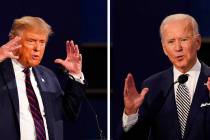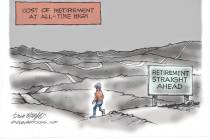EDITORIAL: Government must respect digital privacy rights
Trust is precious, quickly lost and not easily regained. America’s high-tech giants have learned as much and are trying to rebuild faith in their brands by protecting the privacy of their customers.
In the years following the 9/11 attacks, tech companies were highly responsive when the federal government asked them for data to help law enforcement prevent and fight terrorism. Everything changed in June 2013, however, when former National Security Agency contractor Edward Snowden leaked information detailing not only the degree of digital snooping by the government, but the fact private industry enabled it.
Americans have many suspicions of the federal government to go along with their low expectations. But they were rightly upset that high-tech and telecommunications companies — the creators of products and technologies that billions of people use in very personal ways every day — would so quickly cave in to pressure from Washington.
Businesses are trying to rebuild trust by distancing themselves from government. Not only are companies increasingly denying government requests for information, but they are also taking steps to make their technologies more secure.
The creators of WhatsApp, a messaging service owned by Facebook, are encrypting text messages sent between Android phones and say that they won’t be able to break the codes — even if asked to do so by law enforcement. Apple, too, has added new encryption technology that makes unlocked iPhones unsearchable by the government. Even if ordered by a court to turn over information, Apple says, the company won’t be able to. Google has since added similar encryption to phones that use its Android operating system.
Of course, the government is none too pleased about the tech world’s renewed dedication to customer privacy. According to The Wall Street Journal, during a meeting last month with general counsel for Apple and two of the tech giant’s employees, Deputy Attorney General James Cole chastised the company, saying Apple’s new encryption technology could cause a child to die if police couldn’t search a suspect’s phone.
Apple CEO Tim Cook was unmoved.
“Look, if law enforcement wants something, they should go to the user and get it,” he said shortly after the meeting. “It’s not for me to do that.”
Mr. Cook is right. In 1999, a federal appeals court ruled that computer code, including encrypted code, is protected speech under the First Amendment. Technology and telecommunications companies should be applauded for trying to stand up to the federal government to limit snooping and intrusions on the privacy of Americans. Authorities still have a constitutional remedy at their disposal if they have probable cause: If a child’s life depends on a search of a suspect’s phone, get a judge to sign a warrant.
The advancement of technology does not invalidate the Bill of Rights, nor does it give Washington permission to become an invisible member of our “family and friends” plans.























